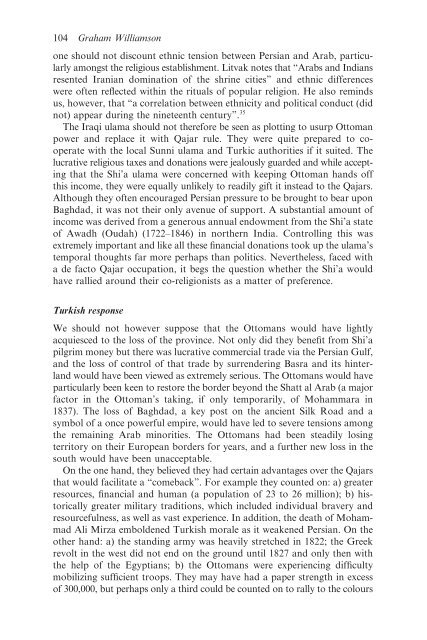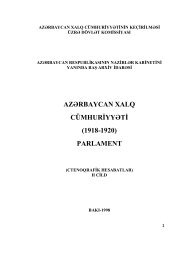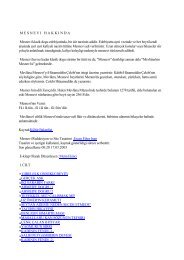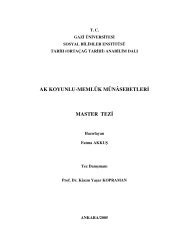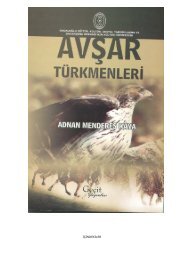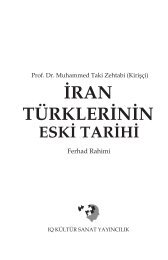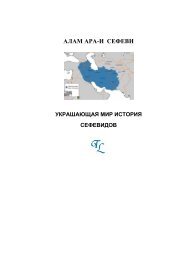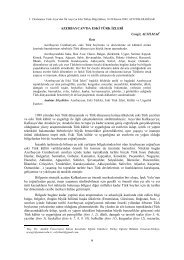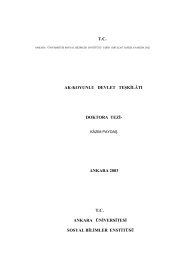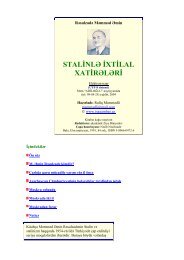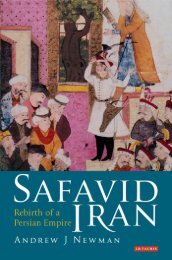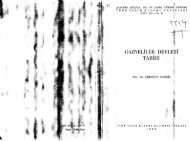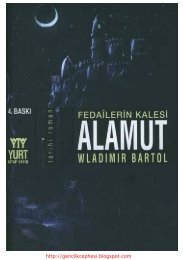War and Peace in Qajar Persia: Implications Past and ... - Oguzlar.az
War and Peace in Qajar Persia: Implications Past and ... - Oguzlar.az
War and Peace in Qajar Persia: Implications Past and ... - Oguzlar.az
- No tags were found...
You also want an ePaper? Increase the reach of your titles
YUMPU automatically turns print PDFs into web optimized ePapers that Google loves.
104 Graham Williamsonone should not discount ethnic tension between <strong>Persia</strong>n <strong>and</strong> Arab, particularlyamongst the religious establishment. Litvak notes that “Arabs <strong>and</strong> Indiansresented Iranian dom<strong>in</strong>ation of the shr<strong>in</strong>e cities” <strong>and</strong> ethnic differenceswere often reflected with<strong>in</strong> the rituals of popular religion. He also rem<strong>in</strong>dsus, however, that “a correlation between ethnicity <strong>and</strong> political conduct (didnot) appear dur<strong>in</strong>g the n<strong>in</strong>eteenth century”. 35The Iraqi ulama should not therefore be seen as plott<strong>in</strong>g to usurp Ottomanpower <strong>and</strong> replace it with <strong>Qajar</strong> rule. They were quite prepared to cooperatewith the local Sunni ulama <strong>and</strong> Turkic authorities if it suited. Thelucrative religious taxes <strong>and</strong> donations were jealously guarded <strong>and</strong> while accept<strong>in</strong>gthat the Shi’a ulama were concerned with keep<strong>in</strong>g Ottoman h<strong>and</strong>s offthis <strong>in</strong>come, they were equally unlikely to readily gift it <strong>in</strong>stead to the <strong>Qajar</strong>s.Although they often encouraged <strong>Persia</strong>n pressure to be brought to bear uponBaghdad, it was not their only avenue of support. A substantial amount of<strong>in</strong>come was derived from a generous annual endowment from the Shi’a stateof Awadh (Oudah) (1722–1846) <strong>in</strong> northern India. Controll<strong>in</strong>g this wasextremely important <strong>and</strong> like all these f<strong>in</strong>ancial donations took up the ulama’stemporal thoughts far more perhaps than politics. Nevertheless, faced witha de facto <strong>Qajar</strong> occupation, it begs the question whether the Shi’a wouldhave rallied around their co-religionists as a matter of preference.Turkish responseWe should not however suppose that the Ottomans would have lightlyacquiesced to the loss of the prov<strong>in</strong>ce. Not only did they benefit from Shi’apilgrim money but there was lucrative commercial trade via the <strong>Persia</strong>n Gulf,<strong>and</strong> the loss of control of that trade by surrender<strong>in</strong>g Basra <strong>and</strong> its h<strong>in</strong>terl<strong>and</strong>would have been viewed as extremely serious. The Ottomans would haveparticularly been keen to restore the border beyond the Shatt al Arab (a majorfactor <strong>in</strong> the Ottoman’s tak<strong>in</strong>g, if only temporarily, of Mohammara <strong>in</strong>1837). The loss of Baghdad, a key post on the ancient Silk Road <strong>and</strong> asymbol of a once powerful empire, would have led to severe tensions amongthe rema<strong>in</strong><strong>in</strong>g Arab m<strong>in</strong>orities. The Ottomans had been steadily los<strong>in</strong>gterritory on their European borders for years, <strong>and</strong> a further new loss <strong>in</strong> thesouth would have been unacceptable.On the one h<strong>and</strong>, they believed they had certa<strong>in</strong> advantages over the <strong>Qajar</strong>sthat would facilitate a “comeback”. For example they counted on: a) greaterresources, f<strong>in</strong>ancial <strong>and</strong> human (a population of 23 to 26 million); b) historicallygreater military traditions, which <strong>in</strong>cluded <strong>in</strong>dividual bravery <strong>and</strong>resourcefulness, as well as vast experience. In addition, the death of MohammadAli Mirza emboldened Turkish morale as it weakened <strong>Persia</strong>n. On theother h<strong>and</strong>: a) the st<strong>and</strong><strong>in</strong>g army was heavily stretched <strong>in</strong> 1822; the Greekrevolt <strong>in</strong> the west did not end on the ground until 1827 <strong>and</strong> only then withthe help of the Egyptians; b) the Ottomans were experienc<strong>in</strong>g difficultymobiliz<strong>in</strong>g sufficient troops. They may have had a paper strength <strong>in</strong> excessof 300,000, but perhaps only a third could be counted on to rally to the colours


